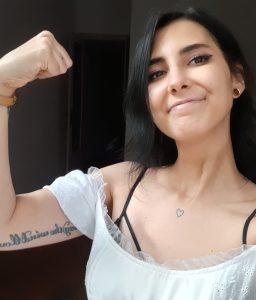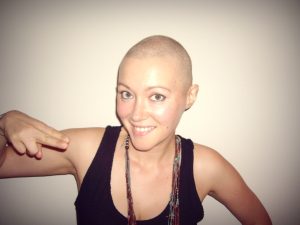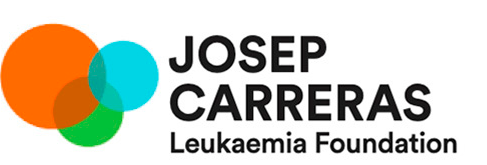Anaplastic large cell lymphoma
The information provided on www.fcarreras.org is intended to support, not replace, the relationship that exists between patients/visitors to this website and their physician.

Mireia
ALK+ anaplastic lymphoma.
“When I was 21 years old, I overcame a non-Hodgkin lymphoma, an ALK+ anaplastic large cell lymphoma. I underwent chemotherapy and radiotherapy treatment. For me, this disease has been a challenge and has helped me to be more fighter and to enjoy all the little things that life offers us even more. The sentence that has helped me always to fight with a big smile is ‘life doesn’t have to be perfect to be wonderful’. I hope it also helps all the unstoppable ones who continue to fight. Above all, don’t give up.”
Information reviewed by Dr. Rocío Parody Porras, Doctor specialising in Haematology. Member of the Management of REDMO (Bone Marrow Donor Registry) and of the Foundation’s medical team. Barcelona Medical Association (Co. 35205)
What is anaplastic large-cell lymphoma?
 Anaplastic large cell lymphoma (ALCL) is a rare and aggressive type of non-Hodgkin’s T-cell lymphoma, belonging to the group of CD30-positive lymphoproliferative disorders, affecting lymph nodes and extranodal regions. Based on the expression of a protein called anaplastic lymphoma kinase (ALK) it is classified into two groups: ALK-positive and ALK-negative. Anaplastic large cell lymphoma accounts for approximately 3% of adult non-Hodgkin’s lymphomas and 10% to 20% of childhood lymphomas. The ALK-positive subtype usually affects children and young adults. The ALK-negative subtype is more common in patients over 40 years of age.
Anaplastic large cell lymphoma (ALCL) is a rare and aggressive type of non-Hodgkin’s T-cell lymphoma, belonging to the group of CD30-positive lymphoproliferative disorders, affecting lymph nodes and extranodal regions. Based on the expression of a protein called anaplastic lymphoma kinase (ALK) it is classified into two groups: ALK-positive and ALK-negative. Anaplastic large cell lymphoma accounts for approximately 3% of adult non-Hodgkin’s lymphomas and 10% to 20% of childhood lymphomas. The ALK-positive subtype usually affects children and young adults. The ALK-negative subtype is more common in patients over 40 years of age.
Its cause is unknown. In the ALK-positive subtype, there is overexpression of the ALK gene (2p23) of the tyrosine kinase receptor of anaplastic lymphoma as a consequence of the t(2;5)(p23;q35) translocation.
Clinically speaking, anaplastic large cell lymphoma is characterised by peripheral, mediastinal or abdominal lymph node involvement. It is manifested by the appearance of large but painless lymph nodes, especially in the cervical and axillary regions. It may also spread to extranodal regions such as bone, bone marrow, subcutaneous tissue, lungs, spleen and liver. General symptoms include loss of appetite and fatigue, as well as fever, weight loss and/or night sweats (B symptoms).
Regarding diagnosis, general purging does not differ from other lymphomas and it is essential to differentiate anaplastic large cell lymphoma from other lymphomas that also express CD30, such as Hodgkin’s lymphoma or peripheral T lymphomas. On histopathological and immunohistochemical examination of the lymph node biopsy, large atypical cells expressing the CD30 antigen, but also other antigens such as CD3, CD5 or CD2 (especially in the ALK-negative subtype) are found. In the ALK-positive subtype, the ALK protein is detected by immunohistochemistry.
What is the treatment for anaplastic large cell lymphoma?
 This fast-growing lymphoma mainly affects the lymph nodes and is treated with chemotherapy regimens, such as CHOP (cyclophosphamide, doxorubicin, vincristine, prednisone) or CHOEP (cyclophosphamide, doxorubicin, vincristine, etoposide, and prednisone). Patients with ALK abnormality usually have a favourable response to this treatment. Another alternative could be the chemotherapeutic combination of cyclophosphamide, doxorubicin and prednisone together with the monoclonal antibody brentuximab vedotin (Adcetris®) for the treatment of adult patients with previously untreated systemic anaplastic large cell lymphoma or in combination with cyclophosphamide, doxorubicin and prednisone. Doctors may also recommend radiotherapy for some stage I and II patients.
This fast-growing lymphoma mainly affects the lymph nodes and is treated with chemotherapy regimens, such as CHOP (cyclophosphamide, doxorubicin, vincristine, prednisone) or CHOEP (cyclophosphamide, doxorubicin, vincristine, etoposide, and prednisone). Patients with ALK abnormality usually have a favourable response to this treatment. Another alternative could be the chemotherapeutic combination of cyclophosphamide, doxorubicin and prednisone together with the monoclonal antibody brentuximab vedotin (Adcetris®) for the treatment of adult patients with previously untreated systemic anaplastic large cell lymphoma or in combination with cyclophosphamide, doxorubicin and prednisone. Doctors may also recommend radiotherapy for some stage I and II patients.
This lymphoma often responds well to treatment and long-term survival is common, especially if the lymphoma cells have too much ALK protein. If the cells lack the ALK protein or if the lymphoma reappears after initial treatment, patients may need more intensive treatments, including high-dose chemotherapy followed by a stem cell transplant.
Crizotinib (Xalkori®) is approved for the treatment of paediatric patients aged 1 year and older and young adults with relapsed or refractory systemic anaplastic large cell lymphoma with ALK abnormality (ALK+).
What are the chances of patients with anaplastic large cell lymphoma being cured?
With treatment, ALK-positive subtype patients (5-year survival rate of 70-80%) have a better prognosis than ALK-negative subtype patients (5-year survival rate of 33-49%). Relapses confer a worse prognosis.
Breast implant-associated anaplastic large cell Lymphoma (BIA-ALCL)
In 1995, the first article linking anaplastic large cell lymphoma to the fact of carrying breast implants (BIA-ALCL) was published. It is important to note that this is a very rare entity.
In these cases, the lymphoma develops around the periprosthetic capsule (around the prosthesis) and in the fluid surrounding the implant. It is usually successfully treated by removal of the implant with complete capsulectomy (an operation that involves the removal of the periprosthetic capsule, the fibrous casing created by the body around breast prostheses after breast augmentation).
More information at Spanish Medicines Agency.
Links of interest concerning medical issues relating to anaplastic large cell lymphoma
Anaplastic Large Cell Lymphoma. Lymphoma research Foundation
Anaplastic Large Cell Lymphoma. Cleveland Clinic.
Anaplastic large cell lymphoma (ALCL). Macmillan Cancer Support
Links of interest on other topics related to non-Hodgkin’s lymphoma:
TESTIMONIAL MATERIALS
You can order the booklets in paper format for free delivery in Spain by e-mail: imparables@fcarreras.es
BONE MARROW TRANSPLANT
- Bone Marrow Transplant Guide. Josep Carreras Foundation (content in Spanish)
- What is HLA and how does it work? Josep Carreras Foundation (content in Spanish)
- Graft-versus-Host Disease. Josep Carreras Foundation (content in Spanish)
- History of Bone Marrow Transplantation. Josep Carreras Foundation (content in Spanish)
- How is the search for an anonymous donor conducted? Josep Carreras Foundation (content in Spanish)
FOOD
- How to maintain a healthy diet during treatment? Josep Carreras Foundation (content in Spanish)
- Nutrition guide. Leukemia & Lymphoma Society
OTHER
- Ideas on what to take with me to the isolation chamber. Josep Carreras Leukaemia Foundation (content in Spanish)
- Travel tips for people with cancer. Josep Carreras Leukaemia Foundation (content in Spanish)
- Physiotherapy manual for haematological and transplant patients. Josep Carreras Leukaemia Foundation (content in Spanish)
- Prevention and treatment of oral mucositis. Josep Carreras Leukaemia Foundation (content in Spanish)
- Oral hygiene in oncohaematological patients. Josep Carreras Leukaemia Foundation (content in Spanish)
- Fertility manual: Suffering from blood cancer and becoming a parent. Josep Carreras Leukaemia Foundation (content in Spanish)
- Skin care in the oncohaematological patient. Josep Carreras Leukaemia Foundation (content in Spanish)
- Aesthetic Oncology Manual. Josep Carreras Leukaemia Foundation (content in Spanish)
- Leukaemia and sexuality. Josep Carreras Leukaemia Foundation (content in Spanish)
- 7 ways to wear a scarf. Josep Carreras Leukaemia Foundation (content in Spanish)
Links of interest: local/provincial or state entities that can provide you with resources and services specialised in leukaemia, lymphoma or cancer patients:
In Spain there is a large network of associations for haematological cancer patients which, in many cases, can provide information, advice and even carry out certain procedures. These are the contacts of some of them by Autonomous Community:
All these organisations are external to the Josep Carreras Foundation.
STATE
- AMILO (Asociación Española de Amiloidosis)
- ACLIF (Asociación para la cura del linfoma folicular)
- AEAL (ASOCIACIÓN ESPAÑOLA DE AFECTADOS POR LINFOMA, MIELOMA y LEUCEMIA)
- AECC (ASOCIACIÓN ESPAÑOLA CONTRA EL CÁNCER). Present in the different provinces and in many municipalities. Contact the nearest branch or call 900 100 036 (24h).
- AELCLES (Agrupación Española contra la Leucemia y Enfermedades de la Sangre)
- CEMMP (Comunidad Española de Pacientes de Mieloma Múltiple)
- JOSEP CARRERAS LEUKAEMIA FOUNDATION
- FUNDACIÓN SANDRA IBARRA
- GEPAC (GRUPO ESPAÑOL DE PACIENTES CON CÁNCER)
- MPN España (Asociación de Afectados Por Neoplasias Mieloproliferativas Crónicas)
ANDALUCÍA
- AECC (ASOCIACIÓN ESPAÑOLA CONTRA EL CÁNCER). Present in the different provinces and in many municipalities. Contact the nearest branch.
- ALUSVI (ASOCIACIÓN LUCHA Y SONRÍE POR LA VIDA). Sevilla
- APOLEU (ASOCIACIÓN DE APOYO A PACIENTES Y FAMILIARES DE LEUCEMIA). Cádiz
ARAGÓN
- AECC (ASOCIACIÓN ESPAÑOLA CONTRA EL CÁNCER). Present in the different provinces and in many municipalities. Contact the nearest branch.
- ASPHER (ASOCIACIÓN DE PACIENTES DE ENFERMEDADES HEMATOLÓGICAS RARAS DE ARAGÓN)
- DONA MÉDULA ARAGÓN
ASTURIAS
- AECC (ASOCIACIÓN ESPAÑOLA CONTRA EL CÁNCER). Present in the different provinces and in many municipalities. Contact the nearest branch.
- ASTHEHA (ASOCIACIÓN DE TRASPLANTADOS HEMATOPOYÉTICOS Y ENFERMOS HEMATOLÓGICOS DE ASTURIAS)
CANTABRIA
- AECC (ASOCIACIÓN ESPAÑOLA CONTRA EL CÁNCER). Present in the different provinces and in many municipalities. Contact the nearest branch.
CASTILLA LA MANCHA
- AECC (ASOCIACIÓN ESPAÑOLA CONTRA EL CÁNCER). Present in the different provinces and in many municipalities. Contact the nearest branch.
CASTILLA LEÓN
- ABACES (ASOCIACIÓN BERCIANA DE AYUDA CONTRA LAS ENFERMEDADES DE LA SANGRE)
- AECC (ASOCIACIÓN ESPAÑOLA CONTRA EL CÁNCER). Present in the different provinces and in many municipalities. Contact the nearest branch.
- ALCLES (ASOCIACIÓN LEONESA CON LAS ENFERMEDADES DE LA SANGRE). León.
- ASCOL (ASOCIACIÓN CONTRA LA LEUCEMIA Y ENFERMEDADES DE LA SANGRE). Salamanca.
CATALUÑA
- ASSOCIACIÓ FÈNIX. Solsona
- FECEC (FEDERACIÓ CATALANA D’ENTITATS CONTRA EL CÁNCER
- FUNDACIÓ KÁLIDA. Barcelona
- FUNDACIÓ ROSES CONTRA EL CÀNCER. Roses
- LLIGA CONTRA EL CÀNCER COMARQUES DE TARRAGONA I TERRES DE L’EBRE. Tarragona
- MielomaCAT
- ONCOLLIGA BARCELONA. Barcelona
- ONCOLLIGA GIRONA. Girona
- ONCOLLIGA COMARQUES DE LLEIDA. Lleida
- ONCOVALLÈS. Vallès Oriental
- OSONA CONTRA EL CÀNCER. Osona
- SUPORT I COMPANYIA. Barcelona
- VILASSAR DE DALT CONTRA EL CÀNCER. Vilassar de Dalt
VALENCIAN COMMUNITY
- AECC (ASOCIACIÓN ESPAÑOLA CONTRA EL CÁNCER). Present in the different provinces and in many municipalities. Contact the nearest branch.
- ASLEUVAL (ASOCIACIÓN DE PACIENTES DE LEUCEMIA, LINFOMA, MIELOMA Y OTRAS ENFERMEDADES DE LA SANGRE DE VALENCIA)
EXTREMADURA
- AECC (ASOCIACIÓN ESPAÑOLA CONTRA EL CÁNCER). Present in the different provinces and in many municipalities. Contact the nearest branch.
- AFAL (AYUDA A FAMILIAS AFECTADAS DE LEUCEMIAS, LINFOMAS; MIELOMAS Y APLASIAS)
- AOEX (ASOCIACIÓN ONCOLÓGICA EXTREMEÑA)
GALICIA
- AECC (ASOCIACIÓN ESPAÑOLA CONTRA EL CÁNCER). Present in the different provinces and in many municipalities. Contact the nearest branch.
- ASOTRAME (ASOCIACIÓN GALLEGA DE AFECTADOS POR TRASPLANTES MEDULARES)
BALEARIC ISLANDS
- ADAA (ASSOCIACIÓ D’AJUDA A L’ACOMPANYAMENT DEL MALALT DE LES ILLES BALEARS)
- AECC (ASOCIACIÓN ESPAÑOLA CONTRA EL CÁNCER). Present in the different provinces and in many municipalities. Contact the nearest branch.
CANARY ISLANDS
- AECC (ASOCIACIÓN ESPAÑOLA CONTRA EL CÁNCER). Present in the different provinces and in many municipalities. Contact the nearest branch.
- AFOL (ASOCIACIÓN DE FAMILIAS ONCOHEMATOLÓGICAS DE LANZAROTE)
- FUNDACIÓN ALEJANDRO DA SILVA
LA RIOJA
- AECC (ASOCIACIÓN ESPAÑOLA CONTRA EL CÁNCER). Present in the different provinces and in many municipalities. Contact the nearest branch.
MADRID
- AECC (ASOCIACIÓN ESPAÑOLA CONTRA EL CÁNCER). Present in the different provinces and in many municipalities. Contact the nearest branch.
- AEAL (ASOCIACIÓN ESPAÑOLA DE LEUCEMIA Y LINFOMA)
- CRIS CONTRA EL CÁNCER
- FUNDACIÓN LEUCEMIA Y LINFOMA
MURCIA
- AECC (ASOCIACIÓN ESPAÑOLA CONTRA EL CÁNCER). Present in the different provinces and in many municipalities. Contact the nearest branch.
NAVARRA
- AECC (ASOCIACIÓN ESPAÑOLA CONTRA EL CÁNCER). Present in the different provinces and in many municipalities. Contact the nearest branch.
BASQUE COUNTRY
- AECC (ASOCIACIÓN ESPAÑOLA CONTRA EL CÁNCER). Present in the different provinces and in many municipalities. Contact the nearest branch.
- PAUSOZ-PAUSO. Bilbao
AUTONOMOUS CITIES OF CEUTA AND MELILLA
- AECC CEUTA (ASOCIACIÓN ESPAÑOLA CONTRA EL CÁNCER)
- AECC MELILLA (ASOCIACIÓN ESPAÑOLA CONTRA EL CÁNCER)
Support and assistance
We also invite you to follow us through our main social media (Facebook, Twitter and Instagram) where we often share testimonies of overcoming this disease.
If you live in Spain, you can also contact us by sending an e-mail to imparables@fcarreras.es so that we can help you get in touch with other people who have overcome this disease.
* In accordance with Law 34/2002 on Information Society Services and Electronic Commerce (LSSICE), the Josep Carreras Leukemia Foundation informs that all medical information available on www.fcarreras.org has been reviewed and accredited by Dr. Enric Carreras Pons, Member No. 9438, Barcelona, Doctor in Medicine and Surgery, Specialist in Internal Medicine, Specialist in Hematology and Hemotherapy and Senior Consultant of the Foundation; and by Dr. Rocío Parody Porras, Member No. 35205, Barcelona, Doctor in Medicine and Surgery, Specialist in Hematology and Hemotherapy and attached to the Medical Directorate of the Registry of Bone Marrow Donors (REDMO) of the Foundation).
Become a member of the cure for leukaemia!


